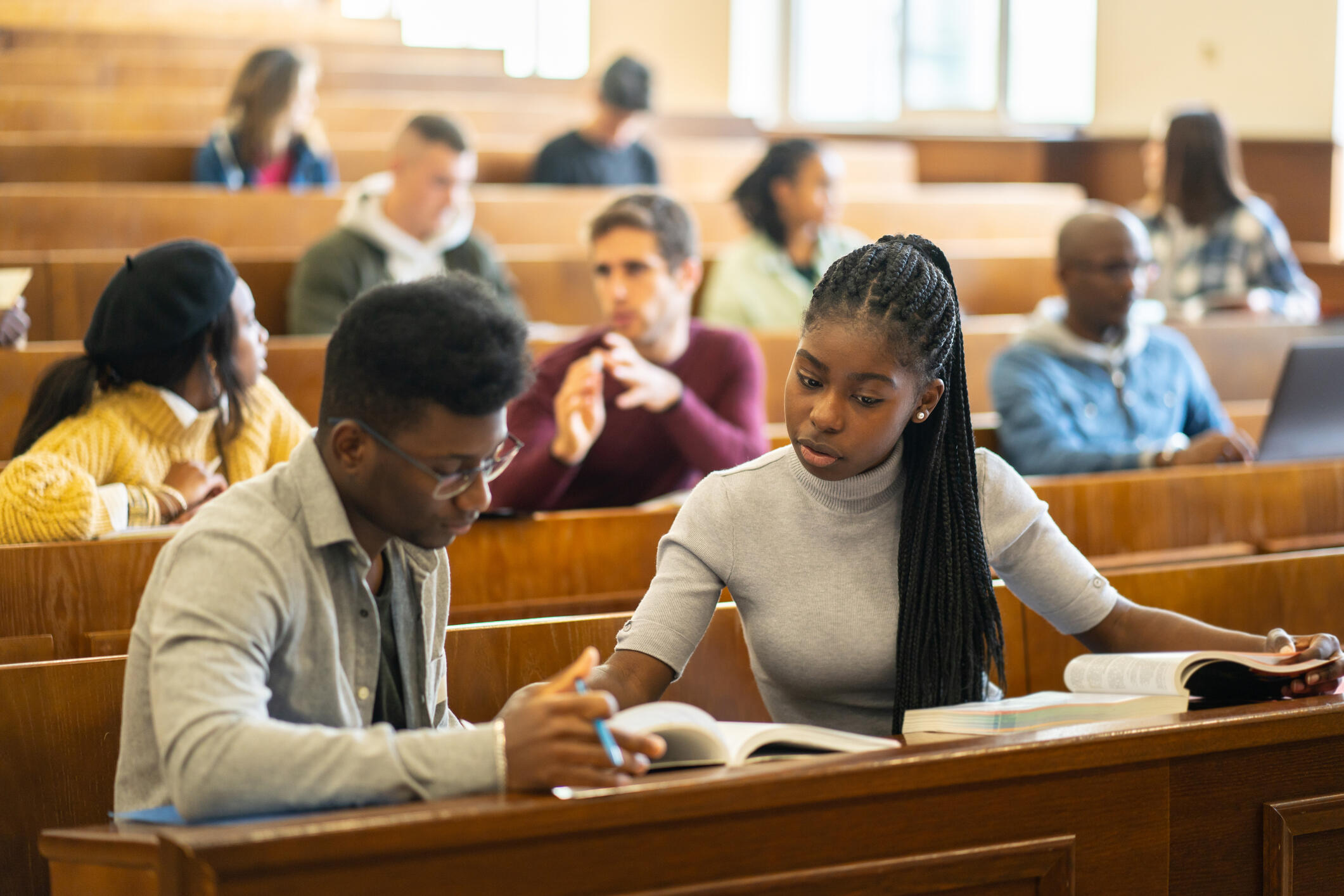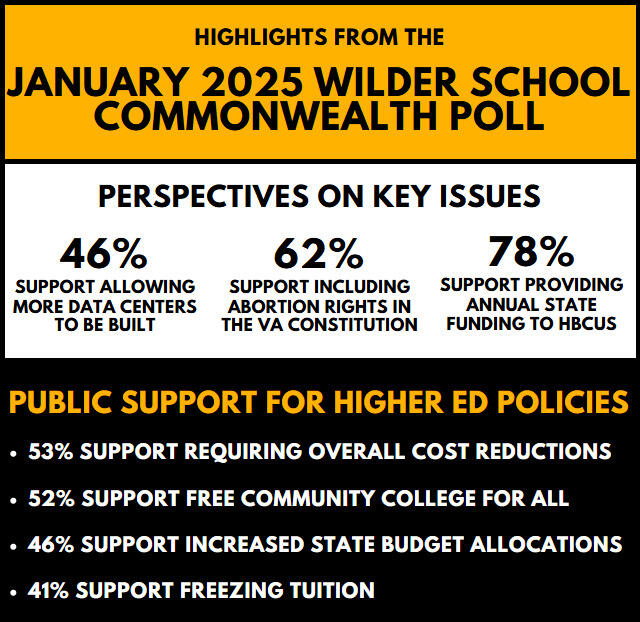
Feb. 5, 2025
62% of Virginians support abortion rights constitutional amendment
Share this story
Today, the L. Douglas Wilder School of Government and Public Affairs at Virginia Commonwealth University released findings on key policy issues from its latest Commonwealth Poll, conducted between Dec. 18, 2024, and Jan. 15, 2025.
Abortion rights
Over 60 percent (62%) of Virginians support including the right to an abortion in the Virginia Constitution. Following the overturning of Roe vs. Wade, Democrats in the Virginia Senate and House of Delegates are leading the charge to change the Virginia Constitution to enshrine abortion rights. If the amendment passes the General Assembly this year, it must be reconsidered by the 2026 General Assembly. Virginia’s constitution requires that any constitutional amendment be approved in two legislative sessions with an election in between. The House of Delegates’ 2025 election would serve as such an intervening election. Given the strong support for the amendment, abortion rights are likely to be a key issue in this November’s campaigns.
Support for Historically Black Colleges and Universities (HBCUs)
In 2022, the Virginia Attorney General released an official opinion allowing the state to fund Historically Black Colleges and Universities (HBCUs). Nearly eight in ten (78%) respondents approve of HBCUs receiving annual state funding for operating expenses. Democrats showed the highest approval (92%), while over 60% of Republicans and 76% of Independents also expressed support.
Respondents were also asked whether they believe Governor Youngkin has adequately funded HBCUs during his administration. Among the 49% of respondents with an opinion on the issue, 27% agreed that Younkin has provided appropriate funding, while 22% disagreed. Republicans (35%) and Independents (29%) were more likely to say Youngkin has appropriately funded HBCUs compared to Democrats (18%).
Two Virginia HBCUs — Hampton University and Virginia Union University — are private institutions, founded during Reconstruction to serve African Americans largely excluded from higher education at the time. Private colleges and universities in Virginia typically do not receive operating funds from the state. Advocates have called for public funding for Hampton and Virginia Union to address broader disparities among HBCUs. Respondents were asked whether they supported or opposed the governor and appropriations chair’s decision not to provide operating funds for these two institutions. Results were split, with 47% agreeing that no funds should be allocated, while 43% believed funding should be provided. Support for withholding funding was highest among Republicans (65%), followed by Independents (42%) and Democrats (32%).
Douglas Wilder, the 66th governor of Virginia, said, “I think the results show, as usual, that the people are still ahead of the elected officials. The poll indicates that an overwhelming majority of the people support funding for Virginia’s Historically Black Colleges and Universities. Gov. Youngkin opposes that. Republican Attorney General Jason Miyares has written an official opinion deeming aid to ‘private institutions’ appropriate and necessary, in several instances. Gov. Glenn Youngkin has opposed that. A majority of those polled do not agree with Youngkin.”

Public perceptions of college education
When asked about the value of a college education, Virginians were divided. A near-equal split emerged between those who believe college remains an essential factor in an individual’s future success (43%) and those who feel its importance has declined (44%). Only 11% of respondents think that college education is of minimal value to future success.
More than half of Democrats (55%) and Independents (53%) believe in the continuing value of college education, while (54%) of Republicans say they once valued college highly but now see it as less essential.
On the cost of higher education, a majority (54%) disagreed that the price of a four-year degree at an in-state Virginia university is “worth it,” while 42% agreed. Democrats were the most likely to say the cost is justified (45%), followed by Republicans (40%) and Independents (33%). These findings closely align with the VCU Wilder School’s August 2024 Commonwealth Poll.
Virginians were also asked about strategies to improve college affordability, selecting multiple options:
- 53% support requiring universities to reduce overall costs.
- 52% favor providing free community college for all students.
- 46% support increasing state budget allocations for higher education.
- 41% favor freezing tuition for an extended period.
Democrats (67%) and Independents (51%) largely support free community college, while Republicans (60%) favor mandating cost reductions at Virginia universities.
University presidents serving on governing boards
Recently, the Joint Legislative Audit & Review Commission (JLARC) recommended that university presidents should not serve as the chairs of their institution’s health systems board due to conflicts of interest. Building on this recommendation, the Commonwealth Poll asked whether university presidents should be barred from serving on any university governing board. Seven in ten Virginians (70%) agreed that university presidents should not serve on governing bodies, while only (18%) believed they should be allowed to do so.
General Assembly issues: Data centers in Virginia
JLARC also recently released a report examining the impact of data centers in Virginia. These facilities, used for digital data processing, storage and networking, have become a major economic driver for the state. However, some argue that Virginia may struggle to meet the rising energy demands required to demand them.
With multiple bills before the 2025 General Assembly addressing data center expansion and regulation, Virginians were asked whether they support allowing more data centers in the state. Opinions were mixed, with 46% agreeing that Virginia should allow more data centers, while 39% opposed expansion. Support was strongest among Republicans (48%) and Democrats (47%), while Independents were less likely to support growth (36%).
Subscribe to VCU News
Subscribe to VCU News at newsletter.vcu.edu and receive a selection of stories, videos, photos, news clips and event listings in your inbox.







